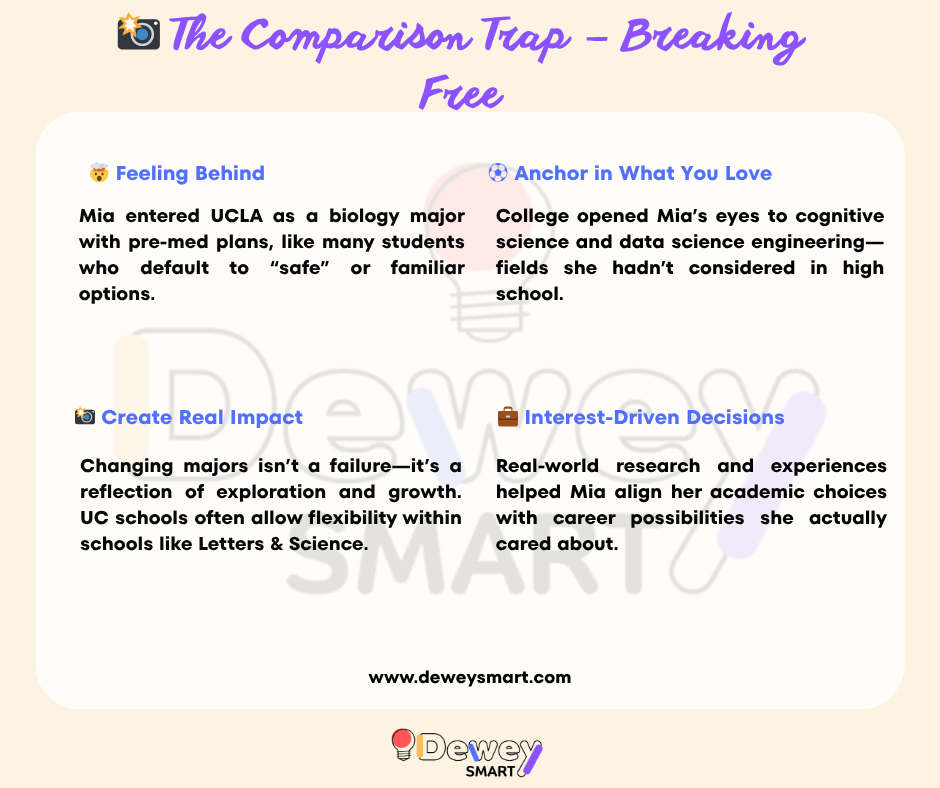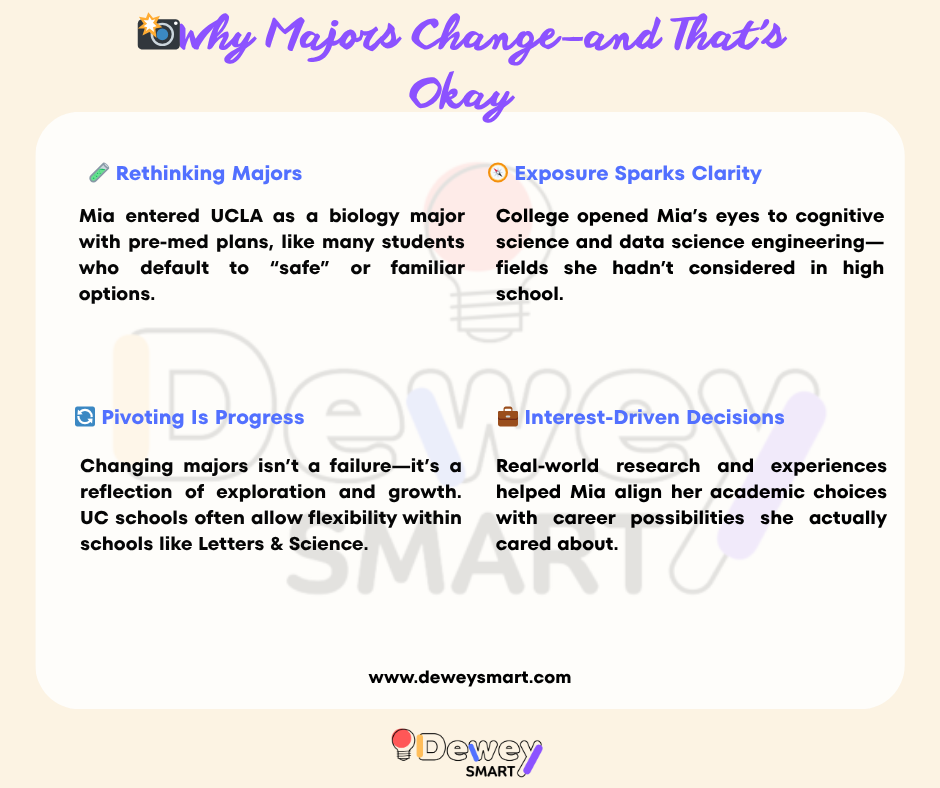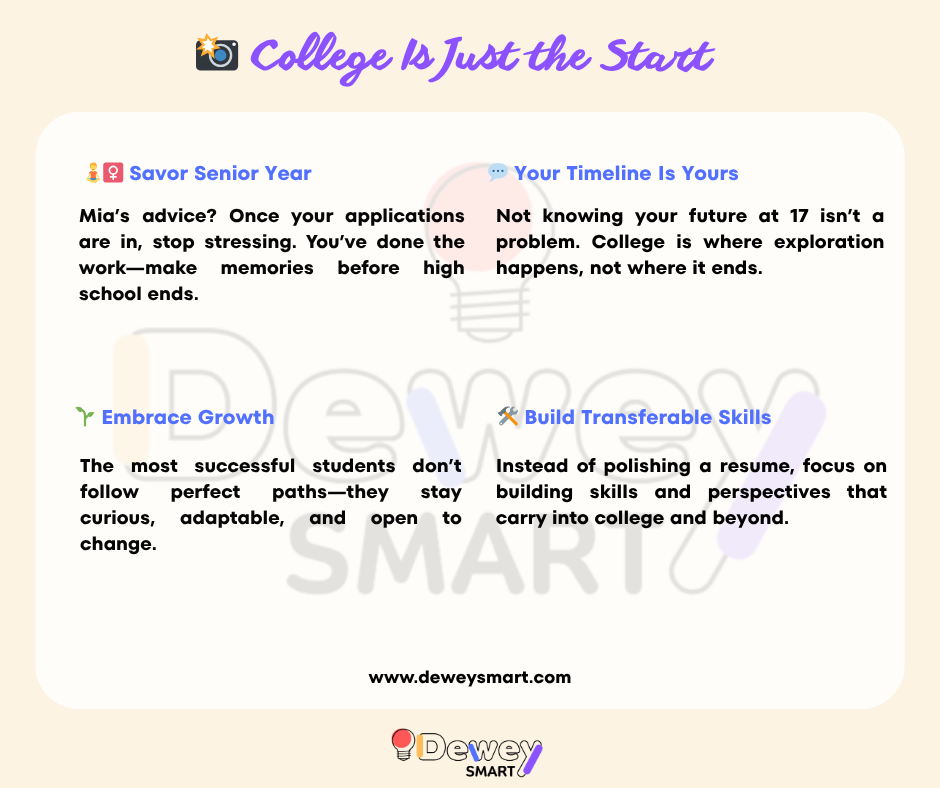
At 17, most high school students feel pressure to have their entire lives mapped out. Choose a major. Pick a career path. Know exactly what you want to become. But what if that pressure is not only unrealistic—it's counterproductive? Mia Avila's journey from a confused high school senior to a thriving UCLA sophomore conducting cutting-edge research offers a refreshing perspective on college admissions counseling and the reality of academic exploration.
"When you're applying to colleges, you're maybe 17 or 18," Mia reflects from her current position as a cognitive science major at UCLA. "You don't have to have everything figured out. You're not expected to, but it may feel like the world expects you to know exactly what you want to do."
Her story provides invaluable insights for families navigating high school students college prep while wrestling with uncertainty about the future—and demonstrates why the journey matters more than the destination when it comes to how to get into top universities.
Diamond Bar High School, like many competitive California schools, fostered an environment where students felt constant pressure to outperform their peers. "My high school was extremely competitive," Mia recalls. "I went to a friend group where everybody was juggling 5 to 10 extracurriculars. We never had time to hang out because people were so focused on building our resumes."
This experience resonates with countless families seeking college counseling services. The competitive landscape of modern college admissions can transform high school into a relentless race where students lose sight of personal growth in favor of resume building. Mia's initial response was typical: constant comparison and self-doubt.
"I felt very behind a lot. I would see my peers and be like, oh my gosh, they're doing so many things. They're doing this internship, they're in this many clubs, and I was constantly comparing myself to them."
The breakthrough came when Mia shifted focus from what others were doing to what genuinely interested her. Soccer became a four-year commitment that provided stability and passion. More significantly, she founded a media club during COVID that addressed a real community need—helping local businesses struggling with online marketing and social media presence.

The media club represents everything UC application tips emphasize about meaningful extracurriculars. It wasn't created to impress admissions officers; it emerged from genuine interest and addressed a community need. "My friends and I were really into photography," Mia explains. "We were able to leverage that passion into pretty much a business, taking photos for businesses and updating their websites and social medias."
This authentic approach to extracurricular involvement illustrates a crucial principle for college application process success: colleges can distinguish between resume padding and genuine engagement. When activities emerge from real interests and create actual impact, they provide rich material for essays and interviews while developing skills that prove valuable in college and beyond.
The lesson extends beyond extracurriculars to academic planning. Rather than choosing activities based on perceived admissions advantages, Mia's approach suggests students should pursue opportunities that align with their interests and values. This authenticity becomes apparent in applications and interviews, setting successful candidates apart from those who construct artificial profiles.
Mia's academic journey exemplifies the flexibility that makes the UC system particularly appealing. She entered UCLA as a biology major with pre-med aspirations—a common path that seemed to align with her academic strengths. However, college exposure to new fields and opportunities led to significant changes.
"After taking a few classes here, after getting a little bit more exposure and networking and taking on new opportunities within the medical sphere, I realized, you know, this isn't for me," she explains. "When I came into my second year, I completely switched my major from biology to cognitive science, took on a new minor in data science engineering, and switched from pre-med to pre-law."
This transition highlights several important points for families worried about major selection during the California admissions process. First, the application major doesn't represent a binding commitment. Second, UCLA's structure allows relatively easy switching within the same school (Letters and Sciences). Third, exploration and change represent normal, healthy parts of college development.

Mia's current research involvement demonstrates the opportunities available to undergraduate students at major research universities. She participates in three different labs:
This level of research engagement as a sophomore illustrates the advantages of attending a major research university. "The alumni network is amazing," Mia notes. "Once you're here, you definitely get opportunities left and right that will open doors across any career you're interested in."
The research experiences also highlight how college can clarify career interests in ways high school cannot. Mia's combination of cognitive science, data analysis, and legal interests represents a sophisticated understanding of how different fields intersect—knowledge that would be impossible to develop without college-level exposure.
Mia's shift from pre-med to pre-law, specifically intellectual property law, demonstrates how college experiences can refine career interests in unexpected directions. Her involvement with the Latinx Pre-law Society, where she serves as a journal editor writing about legal barriers for Latinx communities, combines academic interest with social justice concerns.
This career evolution illustrates why Dewey Smart admissions support emphasizes authentic interest over premature specialization. Students who enter college with genuine curiosity and openness to exploration often discover paths that combine multiple interests in sophisticated ways. Mia's trajectory toward intellectual property law makes perfect sense given her STEM background, technology research, and social justice interests—but this synthesis would have been impossible to predict in high school.

Perhaps Mia's most valuable advice addresses the emotional aspects of senior year that college preparation rarely acknowledges. "I was very, very stressed waiting for applications or admissions to come out and seeing my friends get into schools. I was really, really nervous that I wasn't going to get into a school."
Her recommendation: "Once those applications are done, have fun, just enjoy yourself. Don't worry about whether or not you're going to get into college. The applications are in. Just enjoy your senior year, hang out with your friends, and make the most of your time."
This perspective reflects emotional maturity that comes from successfully navigating the transition from high school anxiety to college confidence. Senior year represents the end of a significant life chapter, and students who spend it entirely focused on college outcomes miss opportunities for closure, celebration, and relationship building that won't come again.
Mia's journey from an anxious high school student feeling behind her peers to a confident college researcher illustrates the limitations of traditional college preparation approaches. Rather than focusing solely on building impressive profiles, her story suggests that authentic engagement, genuine curiosity, and personal growth create stronger foundations for college success.
"You have to recognize how young we are," she reflects. "You don't have enough exposure to every career out there. When you get to college, you'll have that experience of trying different things out."
This perspective offers relief for families overwhelmed by college preparation pressures. While strategic planning and strong academics matter, the goal should be developing qualities that support long-term success: curiosity, resilience, authentic engagement, and openness to growth.
For families seeking guidance through this complex process, professional college counseling services can provide perspective that balances strategic planning with authentic development. The key is finding advisors who understand that college admissions represents the beginning of a journey, not the destination.
Discover how authentic engagement and strategic guidance can transform your college journey. Our team of current college students and admissions experts helps families navigate uncertainty while building genuine strengths that support long-term success.
